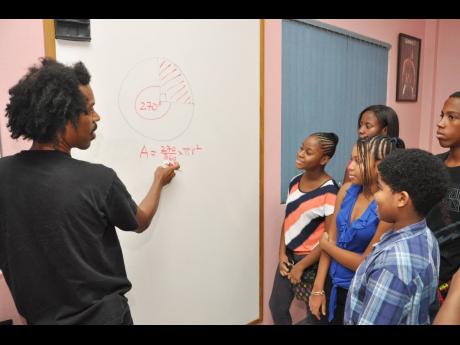Editorial | Reading for maths
Fayval Williams just got some great advice from an expert in the subject on how to solve Jamaica’s maths problem. Teach children to read. Then teach them sums.
Which is the point that this newspaper has been making all along. That is, given the crisis in education, take primary schools, back to basics.
“When a child leaves primary school, they should be able to read and write fluently and understand what they are reading,” said Samuel McDaniel, a lecturer in mathematics at the University of the West Indies, Mona.
“If you cannot read properly, then it is almost impossible for you to do math,” he added.
Around a third of children leave primary school insufficiently competent in language arts to absorb secondary education in that subject. The number is over 40 per cent for mathematics.
But even these figures don’t represent the real depth or breath of the crisis. On average seven per cent of the 12-year-olds perform so poorly in language arts and maths in the Primary Exit Profile (PEP) assessments at grade six they are categorised as being at the beginners stages, requiring major help to function at high school.
Nor is that the entirety of the story. As the Orlando Patterson Commission disclosed in its 2022 report on reforming Jamaica’s education system, 56 per cent of the children assessed under PEP in 2019 couldn’t extract basic information from simple English sentences.
GAINED ATTENTION
These issues, and Dr McDaniel’s solution to the mathematics crisis, have gained attention because of Education Minister Williams’ report on the performance of Jamaican students in this year’s Caribbean Secondary Education Certificate (CSEC), but especially on English and maths. Again, they were not good.
Only 18 per cent of the 31,660 students who wrote CSEC exams passed five or more subjects, with English and maths among them, at the sitting. This is a decline of three percentage points from 2023.
For English, 74 per cent of the students who wrote the exam received pass grades – between grades one and three. Only 33.4 per cent did so in maths.
There was no immediate grade breakdown of the results. It wouldn’t be unreasonable, however, to assume that the bulk of these were Grade III, which the Caribbean Examination Council (CXC) says “represents a fairly good standard of performance”. Grade I represents an “outstanding standard of performance” and Grade II “a good standard of performance”.
With the latest results, Minister Williams has again promised to train more maths teachers and to get them into the island’s schools. This newspaper supports that plan and also endorses the projects backed by the private sector to train more teachers in STEM subjects more broadly.
But like Dr McDaniel, we hold that the crisis demands a reset of the primary education system to ensure that no child is promoted incapable of reading at his or her grade or age levels.
Reading and comprehending in the language of instruction is critical to learning, which is a foundation to children being able to do their sums.
As Dr McDaniel put it in his interview with The Gleaner: “The critical link to mathematics is the ability to read and to understand, because if you cannot read, you cannot understand and if you cannot understand a particular (mathematics) problem, then you cannot solve the problem.”
SIGNIFICANT CONGRUENCE
There is significant congruence, we believe, between Dr McDaniel’s conclusions and the concerns raised by Mark Smith, the new president of the Jamaica Teachers’ Association, with respect to what he sees as an overloaded PEP curriculum that causes burnout in children.
Dr Smith appreciates the conceptual frame upon which PEP was founded, and its aim of engendering creative thinking among children. He was nonetheless worried about the “age (in)appropriateness and the complexity of some of the tasks that children are asked to do”.
It is now just another “high-stakes exam” that is causing physical and emotional harm to children and their parents.
As we have proposed several times before, primary schools concentrate primarily on reading and sums, and an end of system that automatically promotes students from grade to grade, regardless of their ability to read and comprehend.
The existing approach pushes the problem into high schools, with results such as at Denham Town High School in Kingston where over 96 per cent of the students read below their age grade levels – as well as in the results from the CSEC exams.
Our argument isn’t that absolutely nothing else would be taught at the primary schools. Rather, it is that reading and sums must be the core. It must be legislated that no child advances if he or she doesn’t read appropriately.
This approach must be supported by an army of reading specialists, as well as support for teachers to identify children with disabilities of whatever kind that affects their ability to learn.
Doing this, as Dr McDaniel observed, will require courage and political will. For change will be constrained by the assumptions in the education commissariat that more, or the appearance thereof, is better.
The real need is for better education.

